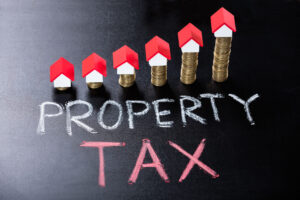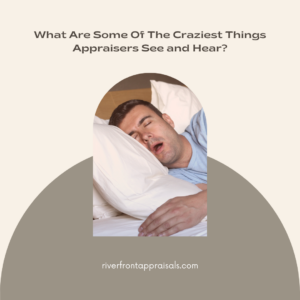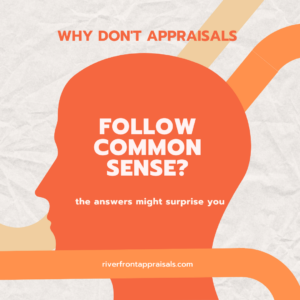
Property Taxes Just Went Up? We’ve Got You Covered!
It’s reassessment season for most folks in our area. Homeowners

This entire year, I’ve been blogging once a month with the purpose of assisting loan officers to better understand the appraisal process. So far, we’ve covered communication with the appraiser, reconsiderations of value, FHA appraisals and a few other topics you should definitely go check out. This month’s blog post will be a slight departure from the traditional topics, as we wade through the waters of bias.
If you were to google ‘Appraiser Bias’ two years ago, you might get a few hits, and the results would likely have to do with the need for appraisers to remain independent and objective throughout the appraisal process. Type that into the search bar today, and you’ll be inundated with hundreds and hundreds of articles, websites, opinions and social media posts dealing with another form of bias: racism.
So, we’ll look at this hot topic, albeit briefly. But I’ll say from the outset that this post will attempt to provide a well-rounded argument for several ways in which an appraiser can be biased, and some may just surprise you. I say we’re going to look at the topic of bias as it relates to racism briefly, because it is not my goal to present a lengthy research paper on the topic, but to give my readers one appraiser’s perspective. If you’d like more information on this topic, there’s plenty of information on the web. However, like any topic you research online, my only caveat is to be careful what you read. There’s a ton of information right now about this topic, but unfortunately, not all of it paints an accurate picture of what’s really going on in our industry (shocking, I know!).
So here’s where we’re headed: we’ll look at three types of bias. Bias for / against a person, bias for / against a cause or interest, and bias for / against a number.
Bias for / against a person
Let me say this from the outset. Racism exists. That is a 100% true statement. It’s an unfortunate statement, but it is a real part of the world in which we live. If someone says otherwise, they are deceived. That being said, it’s not a huge leap to say that appraisers can be racist in the development of their opinions of value. Or is it?
Reports similar to this one keep trickling in: The homeowner (who is black) had their home appraised. Then, they removed all evidence of their race from their home (they left the home for the appraisal, they removed family photos, etc), and it was appraised a second time for $100,000 more (for example). Therefore, the first appraiser was biased against the black family, and undervalued the home. Does anyone see a problem with this line of thinking?
It’s a common thought process. To use a generic example with different numbers, let’s say Appraisal #1 is completed and the estimate of value is $325,000. Appraisal #2 is completed a month later and a different appraiser appraises the same home for $260,000. Well, who do you think gets the angry phone call? Right. The one who came in ‘low’. This happened to us just a few weeks ago. We completed an appraisal on a very nice home and turned in the report. A few days later, the lender sends me an appraisal completed by an out-of-town appraiser just a few months before ours. We were lower than the first appraisal by over $50,000. But the first appraiser didn’t measure the home (even though he was there), so his GLA and basement were hugely overstated. This led to one of the main reasons for the difference in values, but that’s beside the point. What’s interesting is that the lower appraiser was called, and an assumption was made that we were wrong. We missed something. Didn’t use the right comps. How could we be lower than an appraisal that was just completed? What I wanted to say was, “Well, did you call the first appraiser and ask him why he was so much higher than us?” But I didn’t.
Bringing this back to the racial bias example, could the first appraiser in the story above have been racially biased against the black homeowner? Yes. Could he have also been accurate in his estimate of value and the second appraiser too high? Yes. Both are possibilities. But speaking professionally, only the second option is available to the appraiser. Because to be racially biased towards or against a person based on skin color is a direct violation of USPAP, which is our code of ethics. To be ‘too high’ because only the highest sales were used, or incorrect adjustments were made is just being a bad appraiser.
So perhaps in these examples all we have is a difference of opinion, based on different appraisal techniques. Why do we have to jump to the conclusion that the lower appraiser was racially biased, only because the next appraiser was higher? But on the other hand, if it could somehow be proven that the appraiser was undervaluing a home because the owners were of a specific skin color, then shame on the appraiser. Send me your license, and I’ll mail it back to your state board for you. There’s no place for you in our industry.
So to sum up this section, does racism exist? Yes. Can it exist in the appraisal profession? Yes. Is that ok? No. Does it violate our standards? Yes. Can there be other explanations for differing opinions? Yes. Should we keep an open mind when differences occur? Yes.
Bias for / against a cause or interest
While racism in the appraisal industry seems to be the only thing many folks can focus on right now, there are other ways an appraiser can violate USPAP and show bias. And, I would even say, they are just as important in the valuation world.
So the second way an appraiser can be biased is for or against a particular cause or interest. For an example, I’ve included language from USPAP FAQ 365, which asks (in part):
“A client feels that her property is over assessed by the county. She’s asked me to perform a tax consulting service that involves advocacy for her position…This assignment would not include an appraisal…Is this service allowed under USPAP? If not, can I perform this assignment outside of USPAP?”
And here’s what USPAP has to say in response:
“You may not perform this assignment under USPAP. An appraiser, in appraisal practice, may not be an advocate. The Conduct section of the ETHICS RULE states:
An appraiser must perform assignments with impartiality, objectivity, and independence, and without accommodation of personal interests.
An appraiser:
It’s worth noting that USPAP says all of this is a big no-no for an appraiser in appraisal practice. So what does that mean?
“Appraisal practice is defined as:
valuation services performed by an individual acting as an appraiser, including but not limited to appraisal or appraisal review.”
So I can help my client, and I can advocate for her position, only if I’m NOT acting as an appraiser. I must take my appraiser hat off and must not provide any appraisal services. For me, I’ve always wondered about this. Is it even possible for an appraiser to simply stop acting like an appraiser? For me, I’d rather just keep that hat on and not blur any lines.
So go ahead and hire us for tax consulting purposes. We can complete an appraisal, but we can’t be an advocate. And, since most taxing jurisdictions require an actual appraisal to reconsider your property’s value, this will likely be your best course of action.
How else can an appraiser be biased towards or against a cause or interest? Have you ever gone through an ugly divorce? I certainly hope not, but maybe you know someone who has. In our experience, the party who wants to keep the house usually wants a low valuation. Yes, they actually say that! Because the lower the appraisal, the less they have to pay their soon-to-be ex. Of course, the same can be said for the party receiving that equity payout. All of a sudden, the home is the best place ever with SO many amenities and features that are super expensive! “Appraise it as high as possible for me!”
However, when we complete an appraisal for divorce settlement purposes, we can’t advocate for either party. We’re not going to ‘appraise it as high as you can’ as some request, nor are we going to ‘appraise it low because it’s a piece of junk’ as others claim. We must be unbiased in everything we do.
Bias for / against a number
The third and final way in which an appraiser can show bias is toward or against a number. And this is the one no one likes to talk about. Especially Realtors and loan officers. Because the number I’m referring to is the sale price. Some call it ‘rubber-stamping’, but I call it bias, and it goes like this: The home is priced high for the neighborhood (which we’re seeing A LOT right now). List price is $249,900 and if it sells for that, it would set a sale price record for homes in that particular market segment. Multiple offers come in and the resulting contract price is $265,000. Enter the appraiser. There are four comparable sales in the neighborhood ranging from $229,000 – $245,000 all within the past six months. But even after applying positive market conditions adjustments, the value just isn’t matching with the sale price. So the appraiser has a choice. Stay within the neighborhood and use those recent sales she’s found there, or go outside the neighborhood and look for other sales that will support a higher price. And when this happens, if for no other reason than to get the value higher, this is bias. Bias towards the sale price. And it’s wrong. And it happens every day. And it’s a huge issue no one is talking about, because why complain when the home appraises, right?!
In all fairness, though, bias against a number could also take place when an appraiser is just not ‘willing’ to appraise at a sale price – for example – even when there are perfectly adequate sales to support the sale price. Maybe the appraiser is just digging in her heels at a certain price, or maybe her ‘gut’ just tells her the home is priced too high and she’s not about to hit that sale price. Who knows? Either way, being biased against a sale price is just as wrong as always hitting the number. It just doesn’t happen too often. Both are ways the appraiser stops being an appraiser as their objectivity and impartiality are gone.
By way of conclusion, let me point out some language which is in most appraisal forms today. In a section of certifications, or statements – which an appraiser signs and therefore attests to – we read the following:
Certification: “I have no present or prospective interest in the property that is the subject of this report, and I have no present or prospective personal interest or bias with respect to the participants in the transaction. I did not base, either partially or completely, my analysis and/or opinion of market value in this appraisal report on the race, color, religion, sex, age, marital status, handicap, familial status, or national origin of either the prospective owners or occupants of the subject property or of the present owners or occupants of the properties in the vicinity of the subject property or on any other basis prohibited by law.”
Of course, signing this doesn’t automatically mean bias won’t ever happen. It still does. Either towards or against skin color, someone’s particular cause or interest, a sale price, or any number of other things, bias is an issue that some appraisers are still fighting. Thankfully, those in our profession who choose to work this way are not many. There’s always a bad apple or two, in any industry. That’s just part of life. If you’ve been impacted by one of those bad apples, then on behalf of the rest of our industry, I apologize. We can all do better. Appraisers are held to very high standards, and we take them very seriously. Those of us who love our work hold the tenants of impartiality and objectivity to the highest level possible. Appraisers like that will continue serving our customers well. Everyone else…well remember that part about sending me your license? Go ahead and drop it in the mail. Today.
Committed to helping you understand your home’s market value,
Ryan Bays, SRA, AI-RRS

It’s reassessment season for most folks in our area. Homeowners

I feel like we all need a laugh. How about

So this may be a slight break from the norm,
Riverfront Appraisals has been providing comprehensive valuations of residential properties to Western Kentucky and Southwestern Indiana since 2008.